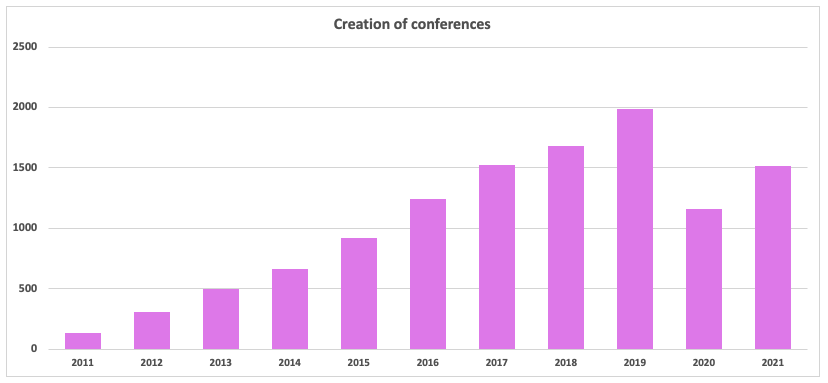The year 2022 is off to a strong start: after the milestone of the first million submission with files on HAL reached on January 6, it is the turn of Sciencesconf to pass the milestone of 10,000 hosted conferences. In its 11 years of existence, the platform has a good record, that of a useful – and free – service for any organizer of scientific events. Perhaps you are one of them and/or more likely one of the 526,000 participants registered for conferences hosted by SciencesConf.
Launched in December 2010, SciencesConf already hosted 105 conferences in 2011: proof that the platform meets the basic need for research activity. The very first conference was the 22nd High Resolution Molecular Spectroscopy colloquium (HRMS 2011). Since then, other editions of this colloquium have also been managed on SciencesConf as well. As it is possible to duplicate parameters of each conference, the configuration of new editions is much facilitated.
The evolution of the number of conferences managed on SciencesConf testifies to the popularity of the platform, just as it reveals the impact of the Covid crisis on the organization of scientific meetings. There are still 1,551 conferences that took place in 2021 and 835 are already scheduled for 2022. The configuration of conference sites does not allow however to obtain indicators on the methodology of organization (face-to-face or online, or blending the two formats).
Scientific management of a congress
SciencesConf is based on the principle of modules, which the organizer can activate or not.
Functionalities such as website hosting and registration management are the most obvious, but the management of the scientific part of the conference is also facilitated by the platform: submission of communication proposals, organization of the peer review process, proceedings. For conferences structured in several themes or sessions, the organizers can assign the role of coordinator to users who will thus be able to manage the reviews of their theme(s)/session(s).
Some key figures :
- Peer reviewing of papers (abstract + full text): 68% of the 149,815 reviewed papers were accepted.
- 318,180 reviews were recorded, which represents 2.12 reviews per paper.
- If we look only at full-text papers, 37,770 papers were reviewed, some by as many as 14 people!
For a better integration of SciencesConf in the HAL ecosystem
The priority defined in the roadmap of SciencesConf is to anchor it in the ecosystem of HAL and to facilitate the transfer of papers in the open repository.
It is declined in 2 action plans:
- Integrate SciencesConf into the CCSD’s global strategy by reinforcing its articulation with HAL, as well as by mutualizing developments of common issues with Episciences. General Conditions of Use (CGU), coherent with those of the other platforms, will be set up.
- Improve the functionalities to better meet the needs of conference organizers, in particular by setting up a gateway to Azur Colloque for the payment of registration fees.
These actions will be accompanied by an increase in the human resources involved in the platform.
